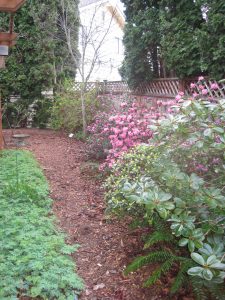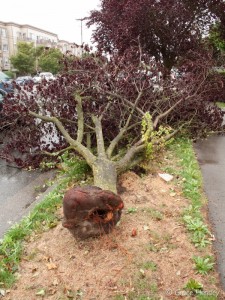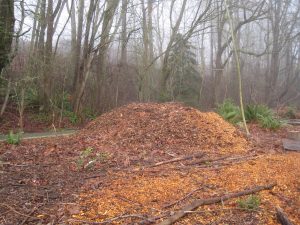This weekend I received a link to a Maryland gardening column with the intriguing title “Murder by Mulch.” My correspondent was concerned that her planned use of arborist wood chip mulch was going to cause problems. I assured her that it would not – but then spent some time looking at the column and putting it through CRAP analysis (credibility, relevance, accuracy, and purpose). It’s a skill that I encourage everyone – not just gardeners – to develop. (You’ll need to read the linked column to understand the context of my comments below.)
So we’ll start with credibility. The column is not a peer-reviewed resource, but then again neither is this blog. The author is a retired Extension specialist with research publications in compost science. That would seem to fit well with the topic. We’ll give it the benefit of doubt for now.

How about relevance? Is this information relevant to the use of mulches in home landscapes? Absolutely.
Is this accurate information? At this point the column starts to fall apart. Let’s start with the photo (you’ll need to go to the linked column to see it). This tree didn’t die because of mulch, but because it had girdling roots – the result of planting trees improperly. Furthermore, there is no mechanism I can think of in which mulch would “strangle” a tree.

Next, there is no distinction made among different types of mulch. Bark is not the same as wood chips, and coarse materials function differently than fine mulches. Bark mulches don’t absorb water like wood chips do, and fine mulches inhibit air and water movement into the soil (coarse mulches don’t cause this problem).

Finally, there is the statement that repeated application of bark will raise soil pH and increase manganese levels. There is no research I could find to support either one of these claims.
The purpose of this column was to educate – but it has failed to do so for the reasons outlined above. Where did the CRAP analysis fall apart?
We need to go back to looking at the author’s credentials. It’s not apparent from his publication record that he’s researched mulches at all. His work was primarily on composts, with the most recent article published in 1998. Nor has he published articles relevant to management of woody plants.

Urban horticulture and arboriculture are relatively new fields of study that are rapidly evolving. Information once accepted as factual decades ago may no longer hold true, as newer research changes our understanding of the way that plants and soils work in managed landscapes.